| Srl | Item |
| 1 |
ID:
131549
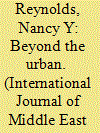

|
|
|
|
|
| Publication |
2014.
|
| Summary/Abstract |
Studies of public space focus disproportionately on cities. Complex and densely populated urban built environments-with their streets, plazas, institutional buildings, housing projects, markets-make concrete and visible attempts to manage difference. They also structure the ways that less powerful residents challenge and sometimes remake elites' spatial visions of the social order. The robust literature in Middle East studies on Islamic cities, colonial cities, dual cities, quarters and ethnicities, port cities, and so forth is no exception to this urban focus.
|
|
|
|
|
|
|
|
|
|
|
|
|
|
|
|
| 2 |
ID:
123763
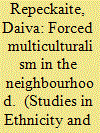

|
|
|
|
|
| Publication |
2013.
|
| Summary/Abstract |
Ethnic migration from the former Soviet Union to Israel is widely considered to be a 'laboratory of ethnicity'. Most of the research into this subject focuses on the cultural and linguistic factors of identity restructuring, whereas critical engagement with social status, class, and urban environment is a much newer development. Social, economic, and urban explanations of the remaining relevance of 'old' (ex-USSR) identifications are particularly needed in the face of increasing alienation among various disadvantaged groups in Israel and the mobilization of large numbers of Russian-speakers around nationalist political parties. On the basis of interviews, participant observations, and media analysis, this article argues that simultaneously deterritorialized and reterritorialized ideas of home and belonging shape this group's social and political mobilization patterns in contested city spaces. Further, I suggest that nationalist mobilization is a strategy to reach beyond ethno-politics and make majority rather than minority claims.
|
|
|
|
|
|
|
|
|
|
|
|
|
|
|
|
| 3 |
ID:
122210
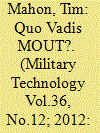

|
|
|
|
|
| Publication |
2012.
|
| Summary/Abstract |
"There is nothing new in warfare", the saying goes, and to a certain degree that is true.- A debate on whether operations in the 21st Centaury have taught us anything new might well prove otherwise. Rarely does one encounter something entirely new and "game changing at the small infantry tactics level appropriate to training for our troops today, or in the future. That is as true of "urban warfare" as it is in any other tactical domain. Or is it? Is there something new out there we have not encountered? If so, what effect is that likely to have on the development of training regimes?
Royal Thai Marines practice weapons handling skills before advancing through the MOUT town at the training area during exercise "Cobra Gold-2012", a recurring multinational and multiservice exercise co-hosted by the United Kingdom of Thailand and the US designed to advance regional security by exercising a multinational force from nations sharing common goals and security commitments in the Asia-Pacific region.
|
|
|
|
|
|
|
|
|
|
|
|
|
|
|
|
| 4 |
ID:
122214
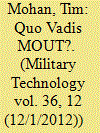

|
|
|
|
|
| Summary/Abstract |
"There is nothing new in warfare", the saying goes, and to a certain degree that is true.- A debate on whether operations in the 21st Centaury have taught us anything new might well prove otherwise. Rarely does one encounter something entirely new and "game changing at the small infantry tactics level appropriate to training for our troops today, or in the future. That is as true of "urban warfare" as it is in any other tactical domain. Or is it? Is there something new out there we have not encountered? If so, what effect is that likely to have on the development of training regimes?
|
|
|
|
|
|
|
|
|
|
|
|
|
|
|
|
| 5 |
ID:
131818
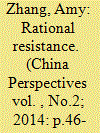

|
|
|
|
|
| Publication |
2014.
|
| Summary/Abstract |
This article examines the logic and framing of homeowner protests against Waste to Energy (WTE) incineration in Guangzhou. I argue that the concept of "rational resistance" emphasised by homeowner activists represents one way of understanding urban environmental contention in China. Urban homeowners use rational resistance to distinguish themselves from both villagers and the state. Their focus on rationality is a critique of the government's reliance on technology to resolve the social problem of waste management.
|
|
|
|
|
|
|
|
|
|
|
|
|
|
|
|
| 6 |
ID:
108547
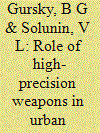

|
|
|
| 7 |
ID:
097932
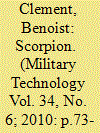

|
|
|
| 8 |
ID:
106290
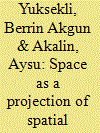

|
|
|
|
|
| Publication |
2011.
|
| Summary/Abstract |
The main objective of this study is to analyze the effects of discourse in the production of designed landscapes within the urban environment. The study concentrates on the social construction of space within the framework of Lefebvre's spatialization trilogy and Foucault's approach to power in order to investigate a public park as a tool for studying the emergence of order and power relationships in society. In this work, Lefebvre's 'spatial practice' concept was considered a 'discursive practice' providing a conceptual ground for the discussion of the problem. Additionally, Lefebvre's definition of spatialization is reconceptualised along with Foucault's notions of power, knowledge and discourse. The problem is studied in reference to Atatürk Park in Balikesir, a small city and regional capital located in the western part of Turkey. Through the discourse of the modernization process, how Atatürk Park as an urban space been socially constructed has been described and analyzed.
|
|
|
|
|
|
|
|
|
|
|
|
|
|
|
|
| 9 |
ID:
106067
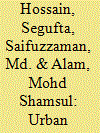

|
|
|
| 10 |
ID:
107451
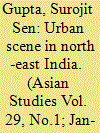

|
|
|